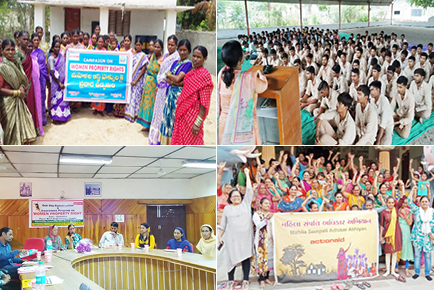Concrete gains on the ground were achieved in the recent campaign to ensure gender justice in property rights, across 14 states of the country.
In Gujarat, working with Ekal Nari Shakti Manch (ENSM), we organized facilitation camps across seven districts to support single women access social security schemes and entitlements. More than 1,300 applications for widow pension were filed, and women were helped to secure income certificates and other important documents. In Rajasthan, 518 single women from Jodhpur district participated in a postcard campaign, drawing the attention of the Chief Minister’s office to the need to set Rs 3,000/- as pension for single women, besides ensuring homestead land and housing rights. In Madhya Pradesh, 30 tribal women from Betul district were helped to gain access to land under the inheritance systems prevalent in the district’s tribal areas. In Odisha, we worked with Antaranga to raise the issue of women’s access to entitlements and property with the district administration of Kandhamal. We are happy to share that the district administration will be conducting a survey to identify single women in the district in order to link them to the schemes and entitlements meant for single women, especially pertaining to their land and property rights.
The Women’s Share campaign was run in villages and cities across the states of Andhra Pradesh, Assam, Bihar, Delhi, Gujarat, Haryana, Himachal Pradesh, Jharkhand, Madhya Pradesh, Odisha, Punjab, Rajasthan, Telangana and Uttarakhand. Numerous consultations at the block and district-level were held, involving government officials, civil society organizations, women’s rights activists and community leaders. The range of issues faced by women from the various marginalized communities, specifically pertaining to their property rights, were shared with the concerned authorities. The campaign succeeded in reaching out to thousands of women and men at the grassroots, including Dalit and tribal communities, minorities, single women, women farmers, women working in the informal sector and students.

